Choosing The Right Custom Software Development Services For Small Business
Table Of Content
Published Date :
15 Apr 2025
For small companies, being competitive sometimes involves solving problems in smart ways and increasing efficiency. But let's face it, off-the-shelf software rarely gets the job done, so businesses end up altering their processes to accommodate those inflexible systems.
Now, imagine a solution that grows with your needs, streamlines your operations, and scales elegantly as your business grows. That's where custom software development for small businesses fits in. Whether you're managing customer relationships, streamlining workflows, or getting your operations future-proofed, custom software puts you ahead in ways generic tools simply can't.
It’s not about building something complex, but a tailored solution that supports how you operate, day to day.
In this guide, we’ll walk through:
- When custom software makes sense for small businesses
- What options are on the table
- And how to choose the right development partner without getting lost in tech jargon
Let’s dive into how custom software can help.
What is Custom Software for Small Business?
For small businesses, bespoke software is a system tailored to work the way you do, fix issues and make processes more efficient where generic or off-the-shelf software might not be able to.
It's building something that's uniquely yours. Whatever the challenge may be, custom software is shaped around your business requirements, not the other way around.. Custom software enables small businesses to scale smarter, respond faster, and create experiences that bring customers back.
Looking for Custom Software Solutions That Meets Your Unique Business Requirements?
Let’s transform your ideas into innovative solutions with our highly customized solutions.
How to Choose The Right Custom Software Development Services For Small Business?
Choosing the right software development partner is crucial for small businesses, and it doesn’t have to be overwhelming. The right custom software should align seamlessly with your business needs and operational processes. Here's how you can ensure you're selecting the best option for your business:
1. Understand Your Business Needs
Before you start looking at potential partners, take time to assess your business. What are the key challenges you're looking to solve? What processes need optimization? A clear understanding of your needs will guide you to a provider who can create a solution that truly fits your requirements.
2. Look for Experience with Small Businesses
Not all software developers have experience working with small businesses. It's important to choose a company that understands the unique challenges small businesses face, including budget constraints and the need for scalable, flexible solutions.
3. Prioritize Collaboration
Custom software development should be a collaborative process. The right partner will work closely with you to understand your goals, incorporate feedback, and make adjustments as necessary. A successful partnership is built on continuous communication and refinement.
4. Evaluate Technical Expertise
Ensure the developer has the necessary technical expertise. They should be well-versed in the latest technologies like AI, cloud solutions, and security protocols, applying the best tech stack suited to your business.
5. Ensure Post-Development Support
After your software is deployed, ongoing support is essential. Make sure the provider offers maintenance and support services to address any issues and ensure your system remains secure and functional as your business grows.
6. Review Their Portfolio
Take a close look at the company’s portfolio. A strong, reputable provider will have experience in delivering successful projects. Request case studies or testimonials from clients in similar industries to get a sense of their capabilities.
7. Security Should Be a Priority
Security is critical, especially for small businesses. Verify that the provider follows best practices for data protection, including secure storage and encryption. They should also be familiar with any industry-specific regulations (like GDPR or HIPAA).
8. Consider Cost and Value
Custom software can be a significant investment, so it's important to balance cost with value. While staying within budget is important, also consider the long-term value the software will bring in terms of efficiency and growth. A higher upfront cost can often pay off in the long run.
Ready To Take Your Small Business To The Next Level?
Our Custom Solutions Could Be The Right Fit For Your Small Business.
Why Do Small Businesses Need Custom Software?
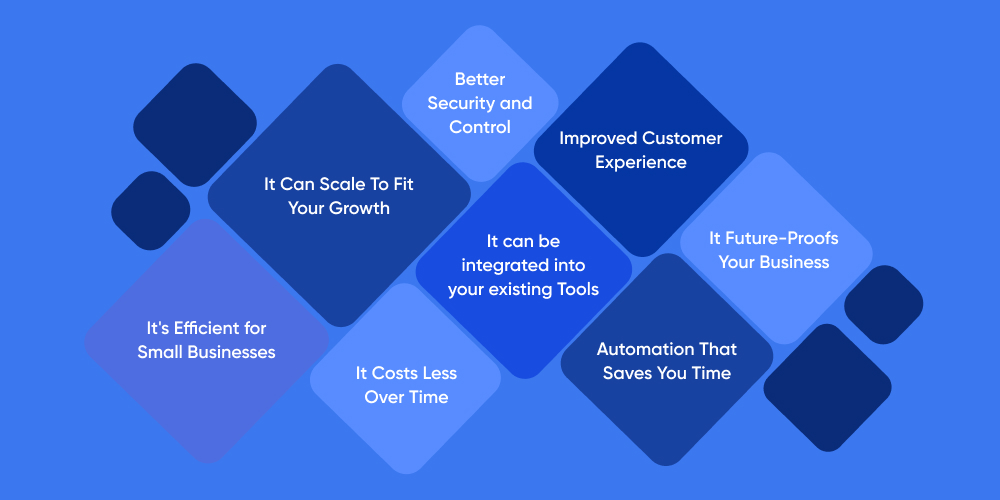
There are several reasons why small businesses should invest in the right custom software development:
1. It's Efficient for Small Businesses
Generic software tends to make companies adapt to the tool rather than the other way around. Custom software does the opposite, being built with how you operate in mind. This translates into less time trying to work within the limitations of generic software and more time on actually growing your business, which is what it's all about.
2. It Can Scale To Fit Your Growth
As your business expands, so do your requirements. Off-the-shelf software can struggle to keep pace which can ultimately mean costly add-ons or new software in its entirety. Custom software adapts with you and makes sure that your systems grow in line with your business aspirations.
3. It Costs Less Over Time
Since you won't spend money on functions you will never utilize or periodic payments, tailored software will repay itself even when it looks expensive upfront. Within years of its usage, it reduces costs and saves time over time.
4. It Can be Integrated Into Your Existing Tools
Most small businesses are already utilizing tools they adore (perhaps a payroll tool or a communication tool). Custom software is able to integrate these tools into a single unified system that removes redundancy and simplifies operations.
5. Better Security and Control
With generic software comes the tendency to rely on third parties with your information, perhaps at the peril of being compromised. With custom software come security protocols that afford you complete greater control over confidential material and serenity of mind.
6. Improved Customer Experience
When your systems work for you, it reflects in the way you serve your customers. Custom software leads to smoother interactions, faster service, and functionality that addresses your customers' needs, keeping them satisfied and loyal.
7. Automation That Saves You Time
Recurring tasks (such as data entry, order tracking, or reporting) can slow your team down. Custom software automates these workflows and saves you time to invest in more strategic, high-impact efforts.
8. It Future-Proofs Your Business
Technology evolves rapidly, and holding on to inflexible, generic systems risks causing your business to fall behind. Custom software evolves in conjunction with the latest trends and technologies like AI, IoT, Big Data, keeping your business at the forefront regardless of what the future holds.
5 Types Of Custom Software for Small Enterprises
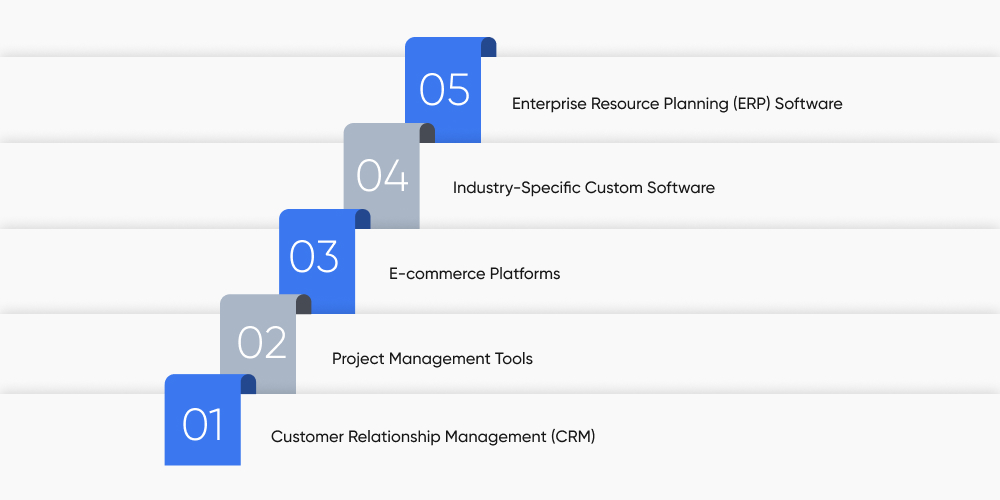
Following are the various types of custom software which small businesses can develop:
1. Customer Relationship Management (CRM)
You can handle customer communication, follow-ups, and sales pipelines without unnecessary clutter of standard CRMs using a custom CRM system. Custom CRM systems are specifically developed for small businesses. It can even include audience-specific tailored features such as loyalty tracking or email marketing.
2. Project Management Tools
Generic project management software has features you'll never employ or is short on functionality that you require. This highly customized project management software molds itself exactly how your team wants to work, no matter if it’s about the structuring workflows for any design agency or if it’s to monitor the deliverables for any company that is into construction. It is tailored to help your business and team more effectively and collaboratively.
3. E-commerce Platforms
Customized e-commerce software allows you to build an experience as unique as your product. Do you want to integrate specific payment methods, offer dynamic pricing, or streamline inventory updates? The custom platform manages all of this and reflects the persona of your brand and enhances your operational needs.
4. Industry-Specific Custom Software
Each industry comes with some quirks. No matter if you are a tanning salon or a local gym that needs to schedule training sessions, custom software for your niche can aid in solving issues as per your operations. This is going to be your business secret weapon to remain ahead of competitors who count on generic tools.
5. Enterprise Resource Planning (ERP) Software
For small businesses, inventory management, supply chains, finances, and employee schedules can be very demanding. All of these are merged into one system that is adjusted to suit your requirements through customized ERP software. You will have one effective solution that keeps your business running instead of using multiple technologies.
What Kind Of Custom Software Development Partner You Are Looking For Your Small Business?
We’d Love To Discuss Our Approach.
Advantages of Custom Software Development for Small Business
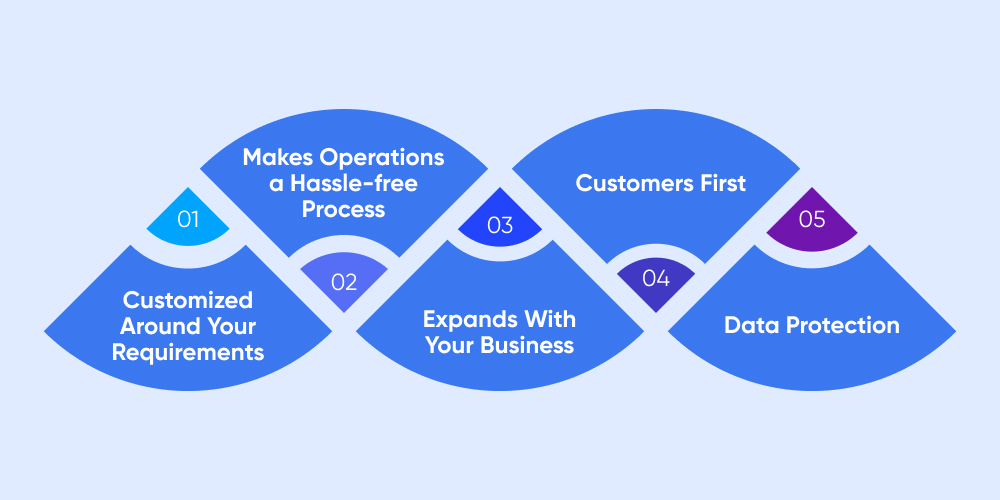
Here are a few ways in which investing in custom software development can turn out to be advantageous for your startup or small business:
1. Customized Around Your Requirements
Off-the-shelf items come with many compromises, but this is not always true with custom software. It is tailored to your business requirements in mind and fills the required gaps and incompetencies that generic software cannot.
2. Makes Operations a Hassle-free Process
Imagine software that makes all your workflows easier right from monitoring to routine work automations. Customized software cleans the mess away and enables your team to work more smartly.
3. Expands With Your Business
Every startup or small business wishes to grow and expand, but not all the tools can keep up with that enhancement. Custom software fits in your business by increasing its features with the rise in your clientele.
4. Customers First
Whenever you do something better for your customers, they for sure notice you. Even if it’s the instant checkout times, more effective communication, or customized features, custom software aids you in developing trust and loyalty.
5. Data Protection
The data of your company is invaluable, and a custom software company ensures that it remains secure. With the integration of security features as per your business requirements, you enjoy the authority while preventing unauthorized access.
Issues Small Business Faced While Creating Customized Software
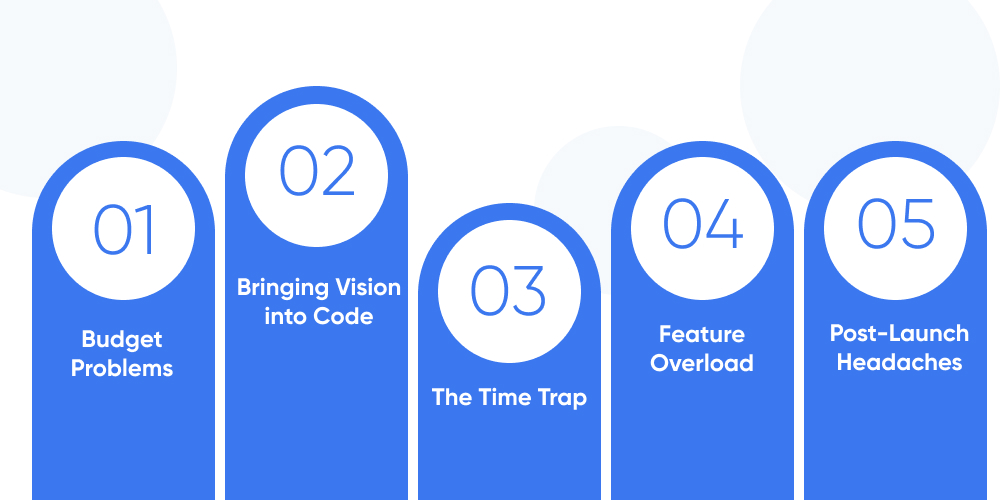
Some of the problems small businesses may encounter when developing custom software are:
1. Budget Problems
Every dollar counts for small businesses, and custom software can be an extravagance. The issue isn't necessarily funding development, but balancing that expense against marketing campaigns, equipment upgrades, or hiring needs. Overextending by spreading resources too thin threatens to undermine growth elsewhere.
2. Bringing Vision into Code
Small business owners know their pain points, but to translate that into the roadmap for a developer? That is a different story. Miscommunication typically results in software that works but maybe isn't exactly the solution it was intended to be.
3. The Time Trap
Growth costs you more than cash. It takes your focus. During developer work, prototype checks, and critiques, entrepreneurs end up being drawn away from keeping the day-to-day operations.
4. Feature Overload
Building custom software occasionally degenerates into trying to do it all. That AI chatbot, inventory manager, and rewards program? Great ideas, but adding them all together might create a clunky, unfocused system that does more to complicate things than simplify them.
5. Post-Launch Headaches
Rolling it out isn't over. Bugs, user pushback, and discovering that a "key" feature was missed can have companies scrambling for patches and cutting into their budget further.
How Can DITS Assist?
Your vision deserves more than "one software to rule them all." We're not here to provide you with a cookie-cutter solution and pat ourselves on the back. No, we do more than that.
We begin by listening, actually listening. What are you worried about at night? What's stopping you? We then craft software that fixes your issues and redefines your work. DITS is there to guide you throughout the process and ensures your software evolves as your company grows. Because your success is our priority. Call us today and let's build custom software for your business.
Conclusion
Choosing the right custom software development for small businesses is just not a cost, it is indeed a future investment for your small business. By streamlining your requirements, enhancing operations and offering a satisfying customer experience, it helps your small venture up and running for long-term success. Although issues such as time and cost to develop app may appear overwhelming, the long-term advantages far surpass the initial challenges. Custom software empowers your employees, secures your information, and makes sure your business keeps pace with the constantly shifting digital world. The question is not if you can afford custom software, but whether or not you can afford to expand without it.
Frequently Asked Questions
Q: Why choose custom software development for small businesses?
Choosing a custom software development for small businesses is very important as it offers highly customized solutions as per business requirements to enhance efficiency while offering a competitive edge.
Q: How long does it take to create custom software for small businesses?
The usual timeline is 3 to 12 months. This spans planning, development, QA testing, and deployment to ensure the software fits your specific needs.
Q: What should small business software have?
Key features vary based on your requirements but commonly involve automation, integration with current tools, scalability, easy-to-use interfaces, and solutions to particular problems your business encounters.
Q: What will be the approximate cost of developing custom software for SMB?
Developing a custom software for a small business can cost around $5,000 for simple systems and for advanced systems it can go up to $50,000+.

Dinesh Thakur
21+ years of IT software development experience in different domains like Business Automation, Healthcare, Retail, Workflow automation, Transportation and logistics, Compliance, Risk Mitigation, POS, etc. Hands-on experience in dealing with overseas clients and providing them with an apt solution to their business needs.
Recent Posts
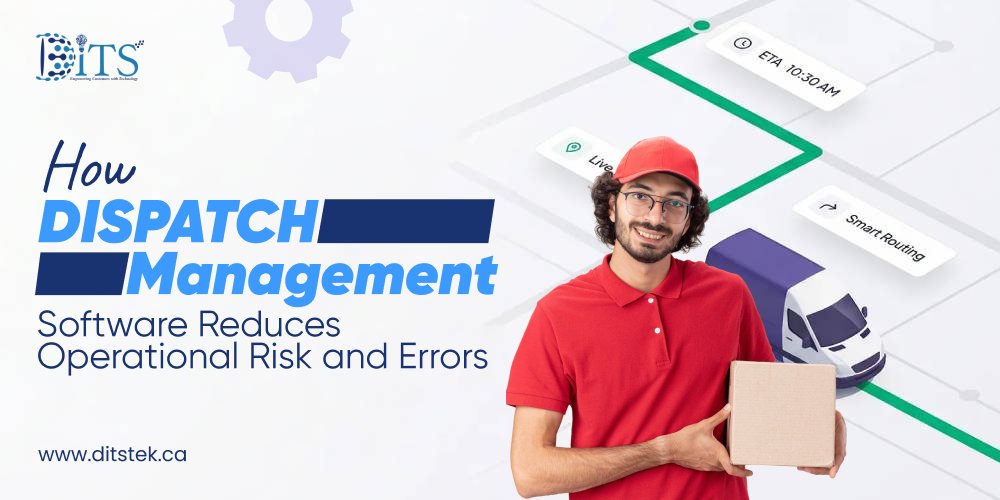
Reduce operational risks and errors by replacing manual, spreadsheet-based processes with dispatch management software.

Discover how bespoke MVP development services help Canadian companies reduce product risk, validate ideas faster, and build scalable products with confidence.
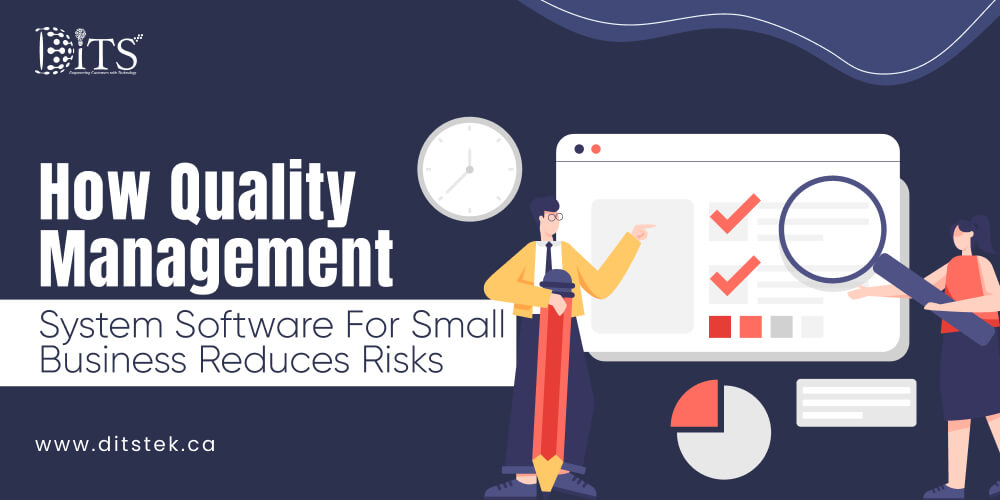
Quality management system software helps small businesses proactively manage compliance, reduce operational risk, improve audit readiness, and build scalable, resilient quality processes across regulated environments.